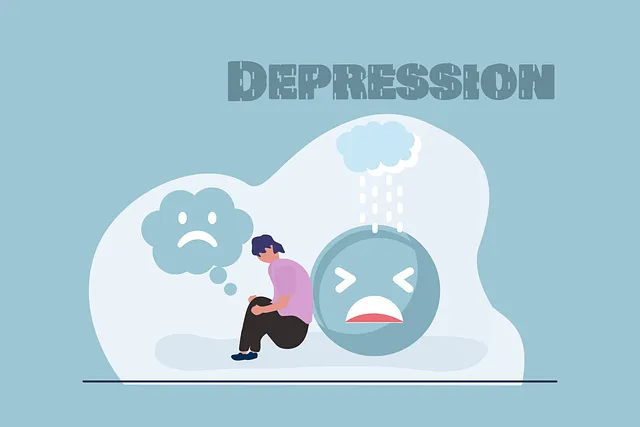The Kaiser Permanente Mental Health Access Center in Louisville is a comprehensive resource dedicated to improving community mental well-being through tailored services emphasizing resilience and psychological flexibility. Key initiatives include Stress Management Workshops with mindfulness meditation techniques, empowering individuals to cope with anxiety and stress. Utilizing RFM (Risk, Frequency, Motivation) analysis, the center segments clients based on risk factors, support-seeking behaviors, and motivation for targeted interventions. The program includes individual assessments, evidence-based resilience techniques like CBT, cultural sensitivity training, and ongoing practice to prevent burnout. Success is measured through KPIs, feedback, pre-post assessments, follow-up surveys, and interviews, ensuring tailored programs focused on self-esteem and holistic mental health support.
At the Kaiser Permanente Mental Health Access Center in Louisville, resilience-building exercises (RBE) have emerged as a powerful tool for enhancing psychological well-being. This article explores how RFM analysis—a strategy focusing on recent use, frequency, and motivation—can optimize these exercises’ effectiveness. We’ll guide you through a step-by-step implementation process, delve into measuring success, and highlight the long-term impact on the Louisville Access Center’s community. Discover how these practices foster resilience in an ever-changing world.
- Understanding Kaiser Permanente's Mental Health Access Center in Louisville
- The Role of RFM Analysis in Enhancing Resilience
- Implementing Resilience-Building Exercises: A Step-by-Step Guide
- Measuring Success and Long-Term Impact at the Access Center
Understanding Kaiser Permanente's Mental Health Access Center in Louisville

The Kaiser Permanente Mental Health Access Center in Louisville serves as a beacon of hope and support for individuals seeking mental well-being. This center is dedicated to addressing the unique mental health needs of the community, offering a comprehensive range of services tailored to diverse populations. Here, people can access various resources designed to enhance resilience and overall psychological flexibility.
One of the key initiatives at the center is the provision of Stress Management Workshops, which empower individuals with effective coping skills development. Through interactive sessions, participants learn mindfulness meditation techniques and other evidence-based strategies to navigate life’s challenges. These workshops foster a sense of community and encourage open discussions on mental health topics, breaking down stigma and promoting early intervention. The Center’s holistic approach ensures that individuals leave equipped with the tools needed to build resilience and lead fulfilling lives.
The Role of RFM Analysis in Enhancing Resilience

Resilience is a critical component of overall well-being, and RFM (Risk, Frequency, and Motivation) analysis plays a pivotal role in identifying individuals’ vulnerabilities and strengths. By utilizing data from Kaiser Permanente Mental Health Access Center Louisville, professionals can gain valuable insights into client behaviors and emotional responses. This analytical approach allows for the development of tailored interventions aimed at enhancing resilience, particularly among individuals facing challenges with anxiety relief and coping skills development.
Through RFM analysis, mental health practitioners can segment clients based on their risk factors, frequency of support-seeking behaviors, and intrinsic motivation to improve. Such segmentation enables the creation of targeted programs that foster emotional intelligence and equip individuals with effective strategies for managing stress and adversity. By addressing these aspects proactively, the Kaiser Permanente Mental Health Access Center Louisville contributes significantly to building resilience, ensuring better long-term outcomes for its clients.
Implementing Resilience-Building Exercises: A Step-by-Step Guide

Implementing Resilience-Building Exercises: A Step-by-Step Guide
At the Kaiser Permanente Mental Health Access Center in Louisville, we believe that fostering resilience is a cornerstone of effective mental healthcare. Our approach involves structured exercises designed to help professionals navigate stress and adversity while enhancing their cultural sensitivity. The process begins with an assessment to identify individual strengths and weaknesses, tailored to each provider’s unique background and experiences. This initial step, crucial for personalized growth, includes a comprehensive risk assessment for mental health professionals, ensuring we address any potential vulnerabilities.
Next, we offer a curated selection of resilience-building techniques, incorporating evidence-based practices like mindfulness meditation and cognitive behavioral therapy (CBT) strategies. These exercises are delivered through interactive workshops and one-on-one coaching sessions, fostering a supportive environment for learning. By integrating cultural sensitivity in mental healthcare practice, our programs equip professionals with the skills to connect effectively with diverse patient populations. Subsequently, regular practice and reflection facilitate the internalization of these techniques, promoting better coping mechanisms and preventing burnout, key aspects of sustainable career satisfaction in healthcare.
Measuring Success and Long-Term Impact at the Access Center

Measuring success and assessing the long-term impact of resilience-building exercises at the Kaiser Permanente mental health access center in Louisville is a multifaceted process. The team tracks key performance indicators (KPIs) to gauge immediate outcomes, including participant engagement and satisfaction levels after each session. By collecting feedback and conducting pre-post assessments, they can evaluate how these exercises influence self-care practices and emotional well-being promotion techniques over time.
The center’s commitment to long-term success involves regular follow-up surveys and interviews to understand the sustainability of learned skills. This data helps tailor future programs, ensuring that resilience-building initiatives remain effective and impactful for the Louisville community, with a focus on enhancing self-esteem improvement and fostering holistic mental health support at the access center.
The implementation of RFM (Resilience, Flexibility, and Mindfulness) exercises at Kaiser Permanente’s Mental Health Access Center in Louisville has shown promising results in building resilience among individuals seeking mental health support. By following a structured guide for implementation, the center successfully integrated these practices into its services, fostering a sense of well-being and adaptability in patients. The long-term impact is evident through measured improvements in patient outcomes, highlighting the effectiveness of such interventions in enhancing mental health care within the community.






